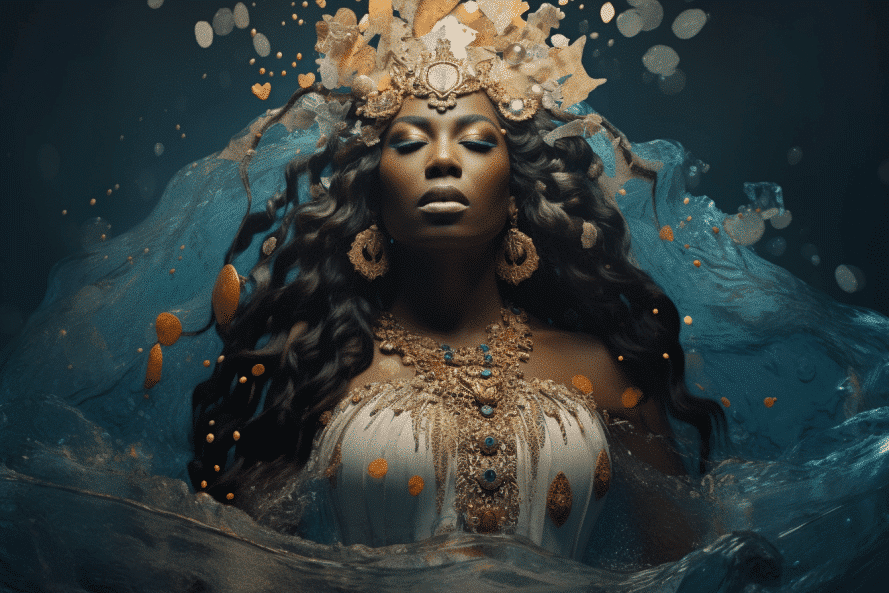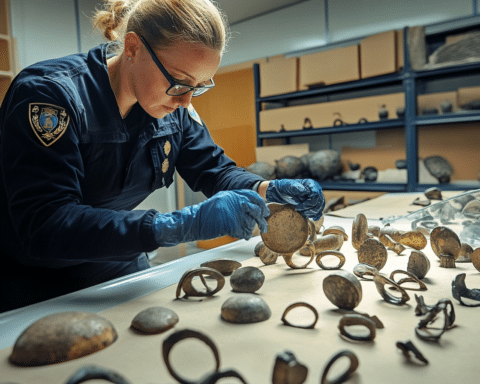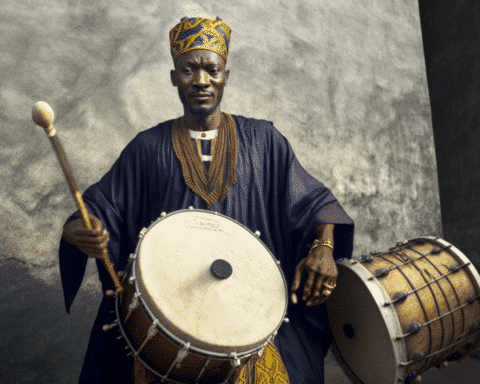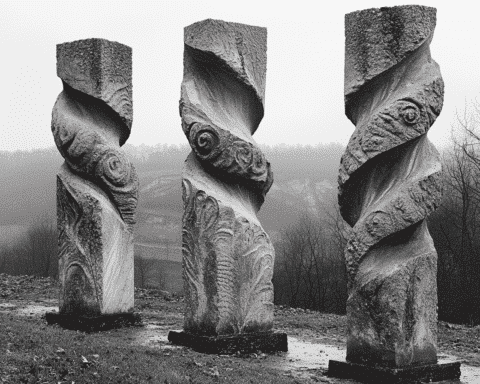Promoting cultural understanding and utilizing it to envision an improved future is a significant objective for Ade Okelarin, an autodidactic photographer and visual artist.
Professionally recognized as “Àsìkò” – meaning “time” or “the moment” in his native Yoruba language from Nigeria, Okelarin frequently incorporates elements of Yoruba tradition into his artwork. His recent series, “Guardians” and “Of Myth and Legend,” delve into the symbols associated with Yoruba deities, known as “Òrìshàs.”
Historically, the Òrìshàs were revered beings endowed with divine abilities. This belief continues to exist not only in West Africa but also across the Caribbean and South America, thanks to the transmission by enslaved individuals and their descendants. However, Okelarin acknowledges that his upbringing in Nigeria during the 80s and 90s lacked comprehensive education on indigenous beliefs. Hence, his artistic journey has involved challenging and rethinking established knowledge.
“My work is about investigating and comprehending what I wasn’t taught in school,” said Okelarin, “it’s about creating an understanding of my heritage and building something that has a legacy.”
Okelarin’s images and portraits of Òrìshàs meld conventional photography with artificial intelligence (AI), digital editing, and collage techniques. They embody his efforts to connect diverse global mythologies, highlighting our shared ancestral narratives.
While working on his projects, he observed commonalities between Yoruba and Western mythology. For instance, the Yoruba deity Sango and Norse god Thor embody thunder and lightning, and the Òrìshà Olokun, like the Greek Poseidon, signifies the sea.
He explains that his work is based on the principle of “looking back to look forward” to understand African societal origins and to help forge a future not driven by Westernization but anchored in cultural ideology and aesthetics.
After relocating to the UK in 1995, Okelarin’s exploration of his own culture shifted his perspective from a Western viewpoint to one that celebrates a “beautifully unique perspective,” enabling him to comprehend his heritage better.
“In an era of escalating globalization, maintaining an identity that promotes improved societal structures is vital,” said Okelarin. “Westernization isn’t the key to progress, but rather, we need a blend of our cultural identity and global offerings or risk losing our uniqueness.” He adds that creating and disseminating these images using contemporary technology and techniques is one way of demonstrating that “our narratives are significant.”
Awareness Advocacy
Despite always having an interest in art and photography – being raised in Nigeria amidst African art collected by his father – Okelarin studied chemistry and pursued a career in the pharmaceutical sector as a data architect. This was partly due to “Nigerian parents who didn’t want (him) to be a starving artist.” However, a change in mindset led him to commit fully to photography by 2015.
In addition to his role as an artist, Okelarin also views himself as an advocate for socio-political issues affecting his community and society. His work, fuelled by his experiences as a Yoruba man living in the UK, covers subjects such as female genital mutilation, masculinity, mysticism, identity, and race.
His mythological imagery and other projects, like the 2020 series “She is Adorned,” employ the concept of layering. Subjects are physically embellished with African beads and jewelry, and photographs are digitally overlaid with elements of his cultural heritage, like fabric and textures. This fusion of traditional photography with AI has “unleashed powerful creative potentials” for him.
Okelarin also ventured into painting and sculpture. In 2022, he produced a globe artwork for the World Re-imagined project, a UK-based art history education initiative focused on the transatlantic slave trade, involving over 100 globes displayed across the country.
His work has been exhibited in the UK, Nigeria, and the US, and he recently released his first set of NFTs with the Bridge Gallery, an NFT photography fine art gallery.
Okelarin remains open to experimentation and growth on his artistic journey, with his work constantly evolving and reaching back into history.
“As I’ve aged, I’ve discovered the beauty and resonance of my culture,” he said. “Living in the diaspora, my cultural heritage has become integral to my identity and who I am. It is a source of strength.”
Ade Okelarin, known as Àsìkò, reminds us that in an increasingly globalized world, our diverse cultural roots continue to shape us. Through his distinctive blend of traditional and digital art, he presents a compelling narrative of Yoruba heritage while simultaneously challenging the narrow view of Westernization as the only path to progress. As he continues to explore and express his culture in increasingly innovative ways, he provides a beacon for others seeking to understand and express their cultural narratives, thereby demonstrating the power of art as a tool for cultural preservation, self-understanding, and societal growth.




